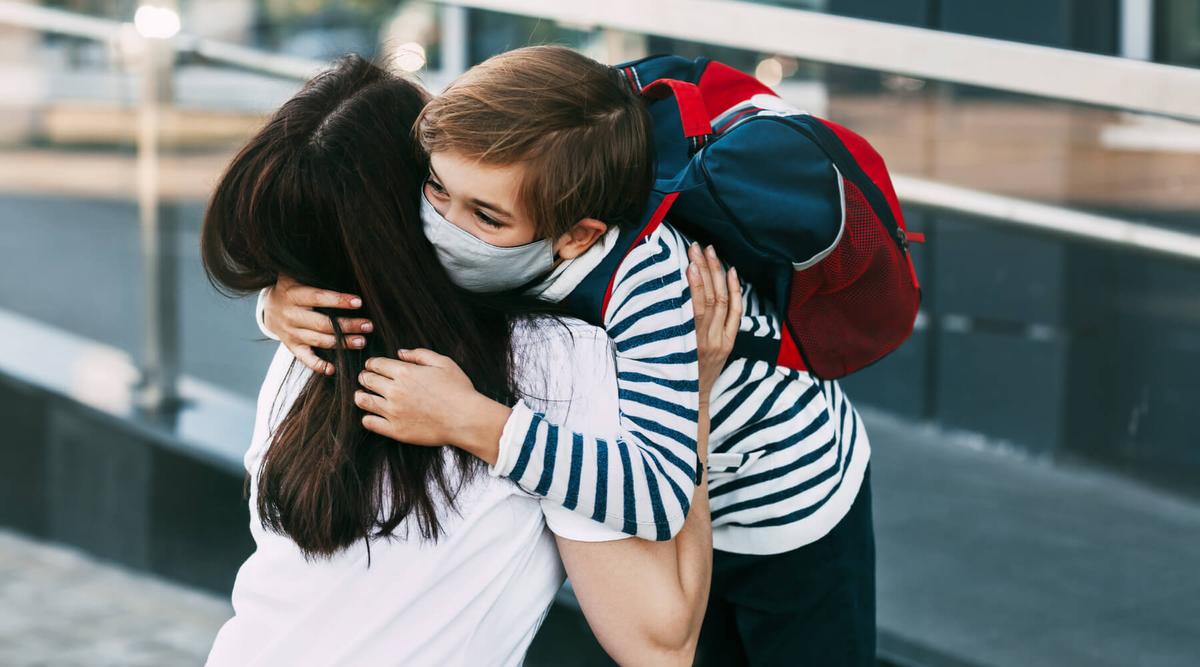School Nurse
Nurse Cecile

School Nurse
Nurse Cecile


The return to school can mean anxious kids. Karen Young, psychologist and creator of Hey Sigmund, shares ways to help children through school anxiety and open the way for brave.
Anything that takes children and teens away from their important adults comes with the potential for anxiety to steal into their world. For even the bravest of hearts, this can cause more distress than it deserves to, especially in relation to school. As intrusive as school anxiety can be, it is not a sign of dysfunction or breakage. It is one of the most human experiences, and it can be managed.
Supporting any avoidance of school will make anxiety bigger. The amygdala, the part of the brain responsible for anxiety, only learns from experience. Once it has associated school with threat, this will continue to drive anxiety until there have been enough experiences of that anxiety giving way to calm.
This can be tough. Often, anxiety will get worse before it gets better. This can make anxiety at school feel fierce, which can understandably move a loving parent to remove children from school before anxiety has had a chance to ease. This makes sense – there is nothing that feels okay about moving our children towards the things that are causing their distress, but here’s the rub. The more that children avoid school, the more the brain will learn that the only way to feel calm and safe is to avoid school. This will catastrophise school and make anxiety bigger.
This is one of the things that makes anxiety so difficult to deal with. I’ve been there myself as a parent, and I know how heart crushing it is to watch a child you love so much, in distress. Something that can help is understanding the important job anxiety is trying to do, and the important role you play in strengthening them against it.
Anxiety is not a sign they can’t cope. It is a call to action. A call to courage. Sometimes it is a call to retreat. Sometimes it is a call to move forward. The hardest part for our children is knowing the difference, which is why one of the best ways to support children through anxiety, is to help them make the call.
To do this, we will often need to ‘go first’ with calm and courage. This will mean calming our own anxiety enough, so we can lead them towards things that are good for them, rather than hold them back when those things feel too big.
The very thing that makes you an amazing parent, can also get in the way of moving them through anxiety. As their parent, you were built to feel distress at their distress. That distress works to mobilise you to keep them safe. This is how it’s meant to work. The problem is that sometimes, anxiety can show up in our children when it doesn’t need to. The good news is that you were also built to move them through this.
We are wired to feel safest to our important people. This is a brilliant part of our human design. When children (or any of us) are faced with separation, anxiety happens to move us to restore proximity to our ‘tribe’. We are safer in groups, and children are safer when they are with bigger, stronger, braver humans, especially when that adult so attached to them, they will do everything they can to keep them safe.
If anxiety only happened in response to real threats, this design would work beautifully, but this just isn’t how anxiety works. Anxiety also happens in response to things that are important or meaningful. School is one of those important, meaningful things but it comes with its own challenges. One of these is the need for separation from important adults, and this will potentially (understandably) breathe life into anxiety.
As much as children are wired to feel anxious when they are separated from their important people, they are also wired for courage and resilience. We can nurture their capacity to do hard things by making sure that whenever they experience anxiety, they also have the opportunity to experience being brave in the face of that. Often, this will mean taking avoidance away as an option.


Sometimes, when decisions are too big for our children, the most loving thing we can do is to take that decision out of their hands.
Think of it like this. Let’s say your child has ice cream every night for dessert, but you want them to choose an apple instead. You’ve talked with them about all the reasons they should choose an apple over ice cream. Then, dessert time comes around and you put the ice cream on the table, hoping they’ll say ‘nup’ to the ice cream, and choose the apple. Of course, they choose the ice cream.
You know that if you take the ice cream off the table, there will be a truckload of trouble coming your way. The battle will be mighty, not just tonight, but probably tomorrow night and the next night and the night after that. Maybe this will go on and on for a couple of weeks. Ugh. Things would be so much easier if they choose the apple themselves right? There’s a really tough decision to make, but you’re leaving the decision to them. When the decision is a hard one, as long as both options are available, it’s understandable that they will choose the easier option. The brutal truth of it all is that the only way to stop them choosing the easy option is to take it off the table.
We are asking them to do something really tough – to go to school – but as long as there is an option for them to avoid school, they will understandably be driven to choose this option. This has nothing at all to do with bad behaviour, and everything to do with a brain that has associated school with a lack of safety and will put up a ferocious fight (or flight) to avoid it.
This will translate into avoidance behaviour (not getting ready, refusal), big feelings, tantrums, aggression, tears, yelling, tummy aches, headaches, and feeling sick at school time. Until there are enough opportunities for anxious children to reach the calm that is on the other side of their anxiety, their anxiety will drive them to avoid.
We need to take avoidance of school off the table. This won’t be easy. In fact, it will probably break our hearts on too many days, but remember why you are doing it. The only way through anxiety is straight through the middle. Anxious brains are strong brains and they will not let go of the fight easily, which is why for a while, you’ll need to be stronger. Of course, if there are other real threats at school, such as bullying, a screaming lack of emotional generosity from the teacher, or environmental sensitivities, these need to be dealt as best we can to clear their way towards brave behaviour.